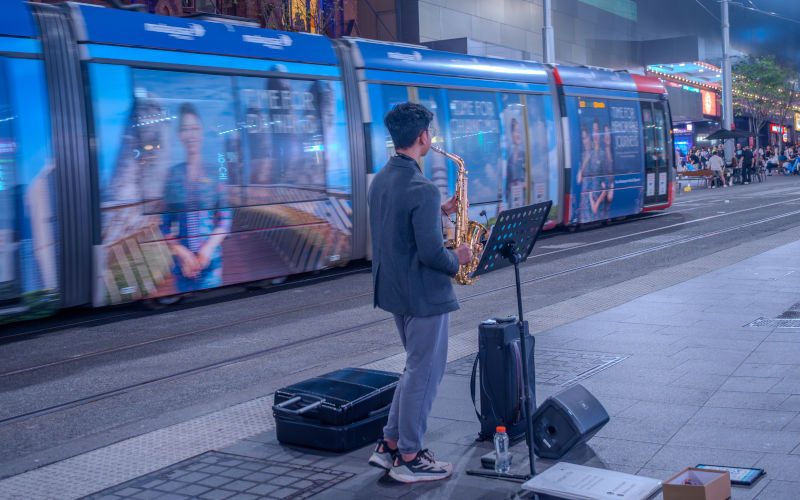Pitch perfect: the case for backing busking
November 23, 2025
The City of Sydney is restricting busking on some streets, but in doing so it’s losing the vibrancy that comes from a community of street entertainers.
The late lamented John Dengate spent many hours busking on the corner of George and Market Streets in Sydney with his tin whistle. It fitted neatly into a coat pocket and an old cricket cap sufficed as a collection tin.
When I spoke to him one day, I asked why he was having a rest from playing. He pointed to a security guard standing at the entrance to the Queen Victoria Building and explained that the guard told him that he was not to stand on the tiles around the building while plying his trade.
So Dengate very carefully stood with his heels perhaps a millimetre away from the tiles. The City owns the footpath and it is the City which licenses buskers. The QVB management would worry about their liability if it appeared that a busker was technically an employee. Such an appearance could be created were Dengate standing on the QVB tiles. In my experience businesses are quite nervous about this.
Buskers face many difficulties. They must secure and pay for licences and insurance and navigate bureaucracies. They have their work curtailed by inclement weather. Sometimes they must endure heckling and they must keep a close eye on their till. Increasingly, people lack the spare change – indeed any cash they might donate. Banks have moved with the times and few today have those helpful counting machines. Perhaps truly professional buskers are acquiring QR codes?
It appears that the City of Sydney has plans to restrict busking on some streets. While there might be other venues available such as on forecourts, the promenade at Circular Quay and in the Devonshire Street tunnel, street performers mostly rely on ‘pitches’ in public thoroughfares.
It appears that Council’s decision was based on complaints received from members of the public. It seems unfortunate that feedback about some types of busking may have led to a blanket decision.
Perhaps buskers will move to more friendly local government areas. It is still possible to find in some areas that on one side of a street the Council ‘welcomes buskers’, while on the other, rangers ask for your licence.
I must confess that I am opposed on principle to the issuing of licences and registration. The gypsy origins of busking suggest that it should be a free activity. The tradition is important to successful busking. Art and creativity should not be confined or smothered in legislation. The travelling history of buskers is a reminder that street entertainers might set up in a number of areas. Paying for registration in each is not viable.
This does not mean that buskers should have an open invitation to do anything they want, anywhere they fancy. Sensible rules should apply and will ensure that buskers are welcomed and do not attract complaints. Buskers will differ over these conventions, but for me they include no amplification, no dangerous activities, no soliciting and no blocking busy access areas such as transport stations and shop entrances.
And while acknowledging that not all buskers are musicians, I would also argue that there should be no music stands and no background recordings. Two old sayings should guide the busker’s attitude. The first is that amateurs practise until they can get it right. Professionals practise until they cannot get it wrong. When you accept money, then you are a professional.
The second saying is that when you play, you should use your talent to show off the beauty of a tune or song. You should not use the tune or song to show off your talent.
Buskers should always be considerate and ensure that their repertoire is broad. They should always have some children’s song ready for those occasions when parents hand money to infants so that they can donate. Buskers should remember also that while pedestrians hear snippets in passing, shop employees hear it all. It is best to move on after a short time and leave the audience wanting more.
Sydney has had street performers since colonial times. Among the better known were Rosie, the Flying Pieman and blind Billy Huntington who played his concertina and sang on what became known as Gowings corner. His repertoire included Ten Thousand Miles Away and as this probably described his own transportation experience, he provides a link to the singers of broadside ballads in London streets. Huntingdon also famously played a weather stained organ that was left on the wharf at McMahons Point. It is interesting to speculate whether Henry Lawson might have been acquainted with him.
Rosie was male and sang his wares at his flower stall. The Flying Pieman was famous for selling pies to passengers as they boarded the Parramatta ferry and then running to their journey’s end to sell them some more.
There is no doubt that busking generally enhances the ambience. People continually comment that hearing a busker puts them into a good mood and that street music makes them feel as though they are in a welcoming community. There is so much alienating about the hard surfaces, the noise, the hustle and bustle of a city, that metropolitan areas need buskers. Some of those affected by the new policies have raised a petition.
While the psychic salary for buskers is huge – especially for those of us lucky enough to be able to direct most of our earnings towards a charity – it does not pay the bills for the true professional.
Given the advantages of having a vibrant community of street entertainers, local authorities should do everything they can to encourage busking. Generally speaking the only assistance buskers require is to be left alone to do their thing.
The views expressed in this article may or may not reflect those of Pearls and Irritations.


